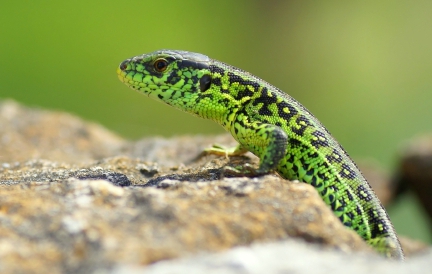Reptile Biology
The biology of reptiles and their habitat requirements is profoundly influenced by their need to actively regulate their body temperature (thermoregulation). Instead of using metabolic processes to raise body temperature like humans and other mammals (homeothermic), reptiles use their external environment to regulate their body temperature (ectothermic). Reptiles need to maintain relatively high temperatures when they are active, and as a consequence have a variable core body temperature.

Reptiles favour warm microclimates, so south-facing slopes, or sites with varied topography offering a range of aspects, and well-drained substrates are preferred. Structurally diverse vegetation with a mosaic of open areas and cover provides protection from predators and the elements. Diverse invertebrate assemblages at high abundance can also occur in areas which offer a range of microclimates, thus providing plentiful prey for native lizards which feed on insects and other small invertebrates. Snakes which are native in the UK are predominantly carnivorous (see below).
There are six native species of reptile in the UK as follows:
- Common or Viviparous Lizard Zootoca vivipara;
- Sand Lizard Lacerta agilis;
- Slow Worm Anguis fragilis;
- Grass Snake Natrix natrix
- Adder Vipera berus; and
- Smooth Snake Coronella austriaca
Conservation Status
Reptile populations have suffered significant declines in the UK due to habitat loss, degradation and fragmentation. Even within protected sites, reptiles have suffered through lack of appropriate habitat management, sometimes leading to declines and local extinctions.
Reptile Surveys
Any development or proposal which has a reasonable likelihood of supporting reptiles and which could be impacted needs to be considered in any development proposal. Surveys need to be undertaken to ensure accurate assessment of the site and any reptile population present. In the absence of survey data, it is difficult to accurately predict the impact of development upon a population of reptiles, and to design appropriate mitigation.
All reptile surveys undertaken by Five Valleys Ecology are designed to comply with stringent requirements following published best practise guidance. Our ecologists possess a wealth of survey experience, together with detailed knowledge of appropriate mitigation designs.
For more information, or to obtain a free proposal, please contact us. We will be happy to provide you with honest and objective advice specific to your project based upon our extensive experience.
References
Edgar, P., Foster, J. and Baker, J., 2010. Reptile Habitat Management Handbook. Amphibian and Reptile Conservation, Bournemouth
